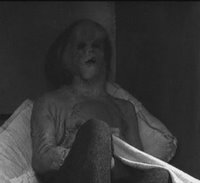It's Not Polite to Stare
 My sister, the Cinelawyer once told me something very interesting about how she perceived Picasso's work. She said that she thought he was just alright until she saw his early works. It wasn't until she saw that he could paint very well while following the rules of art at the time that she could truly appreciate how he was able to break the rules.
My sister, the Cinelawyer once told me something very interesting about how she perceived Picasso's work. She said that she thought he was just alright until she saw his early works. It wasn't until she saw that he could paint very well while following the rules of art at the time that she could truly appreciate how he was able to break the rules.In a similar way, I think The Elephant Man is an absolutely essential piece in David Lynch's oeuvre. It shows how he was able to craft a film that played by the rules of Hollywood and keep his vision and integrity intact. What it manages to do better than any other film I can think of at the moment is chastise the viewers for viewing.
The plot itself is very simple. Dr. Frederick Treves (Anthony Hopkins), a prominent surgeon, while visiting a carnival one day, stumbles upon The Elephant Man, John Merrick (John Hurt). Utterly captivated by Merrick's condition, Treves brings him in to be a permanent resident at his hospital. He gives Merrick dignity that he has never felt before, and Merrick commits suicide.
The first act of the film, before we see Merrick's face, is wonderfully directed. Ly
 nch makes us hate the people who gawk at Merrick, not because we believe in the dignity of all creatures as we would like to think, but because we are jealous of the people who see what he looks like. We paid our money, and we want to see what these people are seeing. It is only after we see Merrick's face and learn of his intellect that we are able to raise ourselves above the level of the gawkers, of only by a little bit.
nch makes us hate the people who gawk at Merrick, not because we believe in the dignity of all creatures as we would like to think, but because we are jealous of the people who see what he looks like. We paid our money, and we want to see what these people are seeing. It is only after we see Merrick's face and learn of his intellect that we are able to raise ourselves above the level of the gawkers, of only by a little bit.Of important note are the two shots that bracket Merrick's first visit to the hospital. Each shot is taken from an elevated position, distancing ourselves from Merrick. This distance works on multiple levels. First, it gives the impression of a peeper looking at Merrick. This is emphasized in the first of the two shots, since we are able to see a staircase leading up to our level. Second, it shows how we look down on him, both literally
 and figuratively. Third, and most importantly, it is the same distance and angle shot. This shows how nothing has changed. Treves doesn't understand him as a human being, and neither do we. We do later, but at this point he is just another freak to us.
and figuratively. Third, and most importantly, it is the same distance and angle shot. This shows how nothing has changed. Treves doesn't understand him as a human being, and neither do we. We do later, but at this point he is just another freak to us."Important" is a word I hate attached to movies. It's saying it's like broccoli. You may not like it, but it's good for you. Movies like Guess Who's Coming To Dinner are Important. And in a way, The Elephant Man is an Important movie. It promotes a message of tolerance. But it does it in a very different way. It isn't a simple film. It creates whole characters, making us sympathize with Dr. Treves even as we realize that he's just as much a gawker as everyone else. This is an impeccable film, and it shows just what Lynch can do, even when he is working within the studio system.
***1/2 / ****


1 Comments:
"Important" and "entertaining" do indeed rarely come together as perfectly as they did with Lynch's "Elephant Man" .. I can't wait to see his latest, but with the way it's being distributed, that will probably have to be on DVD
6:39 AM
Post a Comment
Subscribe to Post Comments [Atom]
<< Home